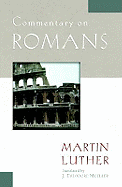
In the fall of 1515 a professor began to teach the book of Romans to his university students. As he painstakingly prepared his lectures, he gradually realized, and then embraced, the book's central theme--salvation is by grace alone through faith alone. That spark of truth ignited Martin Luther's own spiritual life and the fires of reformation that would follow.
Luther's Commentary on Romans presents the very earliest developments of Luther's evangelical theology, which he described as "the theology of the Cross." This popular edition, translated by Theodore Mueller, organizes Luther's notes for modern readers, using explanatory subheadings and parenthetical comments to clarify the great Reformer's thoughts. Some views, which Luther later modified or discarded, have been omitted in order to avoid confusion with his later works. The result is a text that is concise, practical, and devotional.
Luther's Commentary on Romans presents the very earliest developments of Luther's evangelical theology, which he described as "the theology of the Cross." This popular edition, translated by Theodore Mueller, organizes Luther's notes for modern readers, using explanatory subheadings and parenthetical comments to clarify the great Reformer's thoughts. Some views, which Luther later modified or discarded, have been omitted in order to avoid confusion with his later works. The result is a text that is concise, practical, and devotional.



